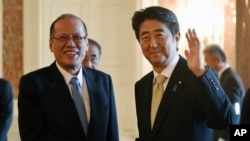Japan and the Philippines agreed Thursday to start talks on transferring Japanese military hardware and technology to the Southeast Asian country trying to upgrade its defenses.
Tokyo eased restrictions on exports of military equipment and technology last year as part of Prime Minister Shinzo Abe's push to expand Japan's military role abroad.
Under a strategic partnership agreement signed by Abe and visiting Philippine President Benigno Aquino III, the two countries will begin talks aimed at the export of Japanese hardware that may include anti-submarine reconnaissance aircraft and radar technology. The rules and details would still have to be discussed.
Japanese media reported that P-3C anti-submarine reconnaissance aircraft and radar technology are possible export items. A sale of the P-3C, originally designed by Lockeed Martin Corp. and produced in Japan by Kawasaki Heavy Industries, would be a more fully fledged military export than those currently being discussed under the new rules.
Tokyo has signed defense cooperation agreements with a number of countries to complement its cornerstone alliance with the United States.
It is discussing exporting US-2 amphibious aircraft — mainly for maritime rescue purposes — to India, and is competing against France and Germany to build Australia's next submarine fleet.
The strategic partnership agreement with the Philippines focuses on defense and security cooperation, but also includes economic assistance from Japan. The two countries also agreed to bolster exchanges between their militaries through defense talks and joint exercises, as well as in disaster relief efforts. Tokyo signed a similar agreement with Malaysia last month.
Earlier Thursday, Japan and the Philippines signed a deal confirming the supply of 10 patrol vessels to the Philippine coast guard so it can step up patrols around South China Sea islands that are claimed by both the Philippines and China.
Abe said Japan will provide further assistance to upgrade Philippine coast guard capabilities.
In a joint statement, Abe and Aquino expressed "serious concern'' about Chinese reclamation work in the South China Sea, warning against any unilateral actions that cause physical change to the maritime environment.
The Philippines and the U.S. have protested China's land reclamation and building up of islands in disputed seas. Japan, meanwhile, is at odds with China over a group of uninhabited islands in the East China Sea.
Japan, Philippines to Talk About Transfer of Military Goods

TOKYO —



